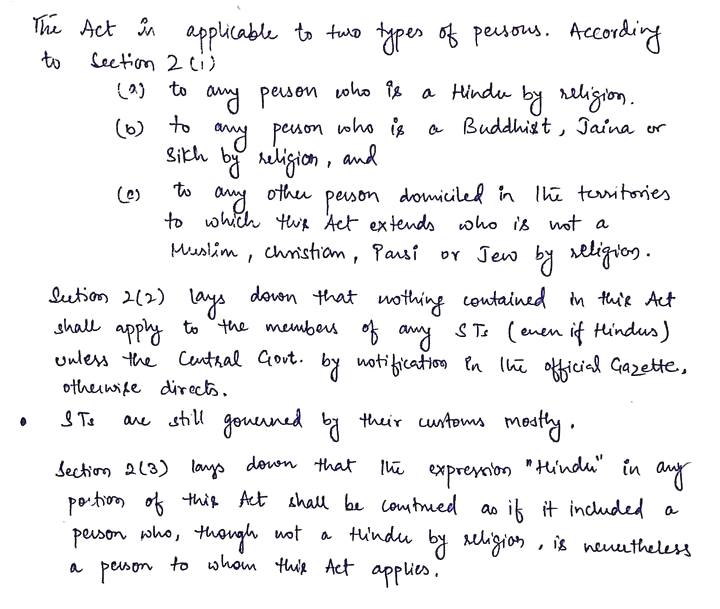1. Short title and extent.—
(1) This Act may be called the Hindu Marriage Act, 1955.
(2) It extends to the whole of India, and applies also to Hindus domiciled in the territories to which this Act extends who are outside the said territories.
2. Application of Act.—
(1) This Act applies—
(a) to any person who is a Hindu by religion in any of its forms or developments, including a Virashaiva, a Lingayat or a follower of the Brahmo, Prarthana or Arya Samaj,
(b) to any person who is a Buddhist, Jaina or Sikh by religion, and
(c) to any other person domiciled in the territories to which this Act extends who is not a Muslim, Christian, Parsi or Jew by religion, unless it is proved that any such person would not have been governed by the Hindu law or by any custom or usage as part of that law in respect of any of the matters dealt with herein if this Act had not been passed.
Explanation.—The following persons are Hindus, Buddhists, Jainas or Sikhs by religion, as the case may be:—
(a) any child, legitimate or illegitimate, both of whose parents are Hindus, Buddhists, Jainas or Sikhs by religion;
(b) any child, legitimate or illegitimate, one of whose parents is a Hindu, Buddhist, Jaina or Sikh by religion and who is brought up as a member of the tribe, community, group or family to which such parent belongs or belonged; and
(c) any person who is a convert or re-convert to the Hindu, Buddhist, Jaina or Sikh religion.
(2) Notwithstanding anything contained in sub-section (1), nothing contained in this Act shall apply to the members of any Scheduled tribe within the meaning of clause (25) of article 366 of the Constitution unless the Central Government, by notification in the Official Gazette, otherwise directs.
(3) The expression “Hindu” in any portion of this Act shall be construed as if it included a person who, though not a Hindu by religion, is, nevertheless, a person to whom this Act applies by virtue of the provisions contained in this section.
Application of the Act
Till this day, there is no precise definition of the term Hindu available either in any statute or in any judicial pronouncement.
Under section 1(2), the Act extends and applies also to Hindus domiciled in the territories to which this Act extends who are outside the said territories.

The next question comes into the mind is Who Are Hindus.
Vinaya Nair v Corporation of Kochi, AIR 2006 Ker 275 : (2006) 3 KLT 17; this judgment has overruled P Ramesh Kumar v Secry Kannaparam Gram Panchayat, AIR 1998 Ker 95 : (1997) II DMC 399, where marriage certificate was refused to a Hindu petitioner married in India to a Buddhist Japanese lady having Japanese citizenship.
The issue involved was as to the applicability of the Hindu Marriage Act, 1955 to a marriage where all conditions for a valid marriage as laid down in sections 5 and 7 of the Hindu Marriage Act, 1955 were complied with but the husband had a Canadian domicile. The parties belonged to Nair community and the marriage was solemnised in accordance with the provisions of the Hindu Marriage Act, 1955. The husband was employed in Canada and the wife was a native of Kannur District in Kerala. The husband was born in Canada and acquired Canadian citizenship and domicile by birth. His application for registration of the marriage under the Hindu Marriage Act, 1955 was refused on the ground of his Canadian domicile. Hence, he approached the High Court. The court held that the petitioners had complied with all the conditions for a valid marriage. Sub-section (2) of
section 1 read with clauses (a) and (b) of section 2(1) was held to be applicable in this case. According to the court the test to be applied was whether both parties were Hindus by religion in any of its forms, and whether conditions under sections 5 and 7 were satisfied. Since everything was found to be in order, the Cochin Corporation was, accordingly, directed to issue marriage certificate.
Vilayat Raj v Sunita, AIR 1983 Del 351 : (1983) 23 DLC 434.
The Hindu Marriage Act, 1955 would also apply to a person who, though a Hindu at the time of marriage, ceases to be so thereafter, by conversion to another religion.
In Ga Arife @ Arti Sharma v Gopal Dutt Sharma, (2010) II DMC 424 (Del) where the appellant wife failed to prove her conversion from Islam to Hinduism before marriage, it was held that she could not claim divorce under the provisions of the Hindu Marriage Act, 1955.
